Scarlets
 | |||
| Union | Welsh Rugby Union | ||
|---|---|---|---|
| Nickname(s) |
Bois Sospan Turks | ||
| Founded | 2003 | ||
| Location | Llanelli, Wales | ||
| Ground(s) | Parc y Scarlets (Capacity: 14,870) | ||
| Chairman | Nigel Short | ||
| CEO | - | ||
| President | Phil Bennett[1] | ||
| Coach(es) | Wayne Pivac | ||
| Captain(s) | Ken Owens | ||
| Most caps | Vernon Cooper (369)[2] | ||
| Top scorer | Stephen Jones (2,850)[2] | ||
| Most tries | Wayne Proctor (173)[2] | ||
| League(s) | Pro12 | ||
| 2016-17 | Champions | ||
| |||
| Official website | |||
|
www | |||
The Scarlets (Welsh: Y Sgarlets) are one of the four professional Welsh regional rugby union teams. Based in Llanelli, south-west Wales the team play at the Parc y Scarlets stadium. They play in the Pro14, as well as competing in the Anglo-Welsh Cup and the European Rugby Champions Cup (which replaced the Heineken Cup from the 2014–15 season). The club was originally named the Llanelli Scarlets but was renamed at the start of the 2008–09 rugby season, following the lead of the Ospreys in 2005.[3]
The Llanelli Scarlets were founded in 2003, as one of the five (now four) regional teams created by the Welsh Rugby Union (WRU). The Scarlets are affiliated with a number of semi-professional and amateur clubs throughout the area, including Welsh Premier Division sides Llanelli RFC, Carmarthen Quins RFC and Llandovery RFC. Through the 2007–08 season, they played most of their games at Stradey Park in Llanelli, but they have also played matches at the Racecourse Ground in Wrexham. The club's new stadium, Parc y Scarlets (English: Scarlets Park), was constructed in nearby Pemberton, and opened in November 2008.[4]
History
Formation
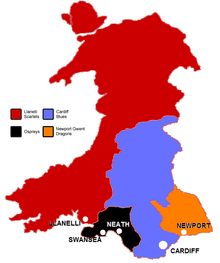
In 2003, the WRU elected to reduce the top tier of Welsh professional rugby from nine clubs into five regions during the introduction of regional rugby union teams in Wales, attempting to mirror the successful formats in Ireland, South Africa, Australia and New Zealand.
Initially, it was planned to have a region playing at Stradey Park, with players coming from Llanelli, Swansea and Neath.[5] This was then modified to have Llanelli and Swansea merging, while Neath joined with Bridgend. Llanelli were opposed to both plans and requested standalone status.[6] Eventually, Llanelli and Cardiff were allowed to remain independent.[7] The Llanelli Scarlets brand was officially launched on 7 July 2003.[8]
The Scarlets officially represent the whole of West and North Wales, based mostly around Llanelli, although attempts have been made at taking the club to other outposts such as Wrexham. Ownership of the Scarlets brand is in the hands of Llanelli RFC, which also runs a second team in the Principality Premiership in the same way as Cardiff.
2003–present
Largely drawn from the very successful Llanelli RFC side of the preceding year, the Scarlets carried that success forward into their inaugural season. They reached the last eight of the 2003–04 Heineken Cup and finished the Celtic League season as champions by four points over Ulster. In the Heineken Cup, the Scarlets were drawn in Pool Four along with Northampton Saints, Agen and Border Reivers. The Scarlets won five of their six matches, losing only to Agen, and finished at the top of their pool before losing to French club Biarritz 27–10 in the quarter-final.
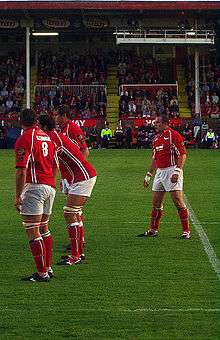
The following season, however, was less successful. Plagued by injuries and retirements, as well as the transfer of influential fly-half Stephen Jones to Clermont, the Scarlets finished a disappointing fifth in the league. They were even less successful in the Heineken Cup, winning just two of their six pool games to finish third in the pool behind Northampton Saints and Toulouse. The salvation of their season came in reaching the final of the Celtic Cup, in which they lost 26–17 to Munster.
The Scarlets again failed to qualify from their Heineken Cup group in 2005–06 and finished sixth in the Celtic League. They did, however, find more success in the newly restructured Anglo-Welsh Cup. After finishing at the top of their pool, they defeated Bath by one point in the semi-finals to reach the final against London Wasps at Twickenham; missing several international players, they lost 26–10. In the Heineken Cup, it was a similar story to the previous season, with the Scarlets winning two of their six fixtures to finish third in the pool again, behind Toulouse and Wasps. Despite finishing sixth in the Celtic League, the team qualified for the Heineken Cup for the 2006–07 season as the second-best-placed Welsh team in the league. They also re-signed Stephen Jones and full-back Barry Davies extended his contract to stay with the Scarlets. The Scarlets' Director of Rugby, Gareth Jenkins, had been appointed as Wales' national team coach, having been with the region since its inception. Phil Davies, then coach of Leeds Tykes, replaced Jenkins at the Scarlets.[9]
At the first home game of the 2006–07 season, an information sheet was handed out to supporters with details of the club's financial situation. There was opposition by local residents to plans by the Scarlets to move to a new stadium and sell their current ground for housing development. The information sheet stated that, due to delays caused by the opposition and benefactors pulling out of the club, it was "extremely unlikely that [the Llanelli Scarlets] could survive to the end of the present season unless other financial assistance is found", which would result in "the loss, probably for all time, of professional rugby in West Wales." Local residents believed, however, that the infrastructure, such as roads and schools, will not cope with 450 new houses being built on the site. On 28 November 2006, the regions secured investment from Tim Griffiths, a London-based businessman.[10]
In the 2006–07 Heineken Cup, the Scarlets recorded one of the most famous victories in their brief history as a region, defeating Toulouse 41–34 away, despite twice trailing by 21 points. This was an unexpected victory, despite the Scarlets having won their first three games of the 2006–07 competition. They later secured their place in the Heineken Cup quarter-final with a convincing 35–11 win over Ulster at Ravenhill. The Scarlets went on to become only the fifth team in the history of the competition to win all their pool matches. They beat current holders Munster 24–15 at Stradey Park in the quarter-finals, but were beaten 33–17 in the semis by a strong Leicester side, putting an end to their hopes of making it 'third time lucky' in Heineken Cup semi-finals. On 30 April 2008, Phil Davies was controversially sacked as the Scarlets' head coach. The reasons for his departure remain unclear, but it is believed that he found out via the media before being informed by club chairman Stuart Gallacher.
The Scarlets moved from Stradey Park at the end of November 2008 to a new ground at Pemberton called Parc y Scarlets. The final Scarlets match played at Stradey Park was on 24 October 2008, against Bristol in the group stage of the Anglo-Welsh Cup. The Scarlets won 27–0 in front of a capacity crowd, which included former Llanelli captains such as Delme Thomas and Phil Bennett.[11]
The Scarlets' first match at their new home was an 18–16 Celtic League defeat to Munster on 28 November 2008.[12] Their first Heineken Cup match at Parc y Scarlets was held on 12 December against Ulster which ended in a 16–16 draw.[13] Both matches were held with reduced capacity, as law requires that a new stadium hold three events at reduced capacity before it is authorised for its full capacity. The official opening ceremony was on 31 January 2009 when the Scarlets faced the Barbarians.
In May 2014, it was confirmed that the four Welsh regions would compete in the annual Premiership Sevens Series after a three-year deal was agreed with BT Sport.[14]
Name and colours


The Scarlets took their name from the nickname of Llanelli RFC, their main feeder club. Llanelli have played in red since 1884 when they played a game against a touring Ireland side.[15] This close link with Llanelli RFC has also led to the Scarlets adopting the scarlet red colour for their primary jerseys, with their secondary colours generally being blue.
The region was originally named the Llanelli Scarlets, but was renamed at the start of the 2008–09 rugby season to more accurately represent the area covered by the region.[16]
Kit suppliers
| Period | Kit providers |
|---|---|
| 2003–2009 | Kooga |
| 2009–2010 | Rhino |
| 2010–2014 | BURRDA |
| 2014–2017 | Kooga |
| 2017- | Macron |
Current kit
The kit is supplied by Kooga. On the front of the shirt, BT Sport is at the centre with Gravellas appearing on the far top left and the far top right. LG: Lloyd & Gravell ltd and Llanelli Star appear on their left sleeve while Castle Howell Bwydydd Foods appear on their right sleeves.On the back of the shirt, Coleg sir gar and Worthington's appear at the top. John Francis appear on the left of their front shorts and below is the website www john francai s co uk while CK food stores appear on the top of their back shorts while INA appear on the left of their back shorts while 7-D appear on the right of their back shorts.
Stadium

From 2003 to the 2007–08 season, the Scarlets played most of their home matches at Llanelli's Stradey Park (also the home of Llanelli RFC). However, they have played several games in North Wales, at Wrexham's Racecourse Ground, to promote the region's geographical representation. The 2006–07 season was planned to be the last season played at Stradey Park, which was subsequently to be demolished for the building of apartments. The Scarlets played every home game of the 2006–07 season at Stradey Park to commemorate the historic ground. They played their last game at Stradey Park on 24 October 2008 against Bristol, and their first game at Parc y Scarlets on 28 November 2008 against Munster.
The new home of the Scarlets and Llanelli RFC, known as Parc y Scarlets (English: Scarlets Park),[17] is in Pemberton. The new stadium cost £23 million to be constructed and holds 14,340 spectators.[18] The first game held at the stadium was Llanelli RFC versus Cardiff RFC held on 15 November 2008.[19] The stadium's main stand is located on the south side of the ground, and houses the new Scarlets museum and club shop, as well as a sports bar, the players' changing rooms and a players' gym. Stadium blueprints planned for the main stand to be about 20 metres (66 ft) tall. Outside the stadium there is a training barn for the players, as well as a training pitch and athletics track. The remainder of the site is taken up by the Parc Trostre retail park.[20]
Current squad
- * Denotes a player who is Welsh qualified.
- ‡ Denotes a player on a WRU 'National Dual Contract'.
2017-18 Note: Flags indicate national union as has been defined under WR eligibility rules. Players may hold more than one non-WR nationality.
British and Irish Lions
The following players were selected for the British and Irish Lions touring squads whilst playing for the Scarlets:
- 2005: Simon Easterby, Dwayne Peel
- 2009: Stephen Jones, Matthew Rees
- 2013: Jonathan Davies, George North
- 2017: Gareth Davies, Jonathan Davies, Ken Owens, Liam Williams
Stephen Jones was also selected for the 2005 Lions tour whilst playing for Clermont Auvergne. Former Scarlets Scott Quinnell, Robin McBryde and Dafydd James were also selected for the Lions on the 2001 tour to Australia while playing for Llanelli RFC.[21]
Notable former players
Players who have won over 20 international caps and have played for the Scarlets:
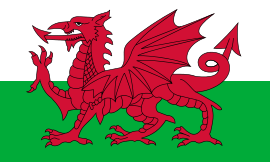 Lee Byrne
Lee Byrne John Davies
John Davies Leigh Davies
Leigh Davies Dafydd James
Dafydd James Dafydd Jones
Dafydd Jones Mark Jones
Mark Jones Stephen Jones
Stephen Jones Robin McBryde
Robin McBryde George North
George North Dwayne Peel
Dwayne Peel Mike Phillips
Mike Phillips Alix Popham
Alix Popham Andy Powell
Andy Powell Rhys Priestland
Rhys Priestland Matthew Rees
Matthew Rees Scott Quinnell
Scott Quinnell Mark Taylor
Mark Taylor Gavin Thomas
Gavin Thomas Iestyn Thomas
Iestyn Thomas Liam Williams
Liam Williams Chris Wyatt
Chris Wyatt David Lyons
David Lyons Jon Thiel
Jon Thiel DTH Van der Merwe
DTH Van der Merwe Olly Barkley
Olly Barkley Ben Morgan
Ben Morgan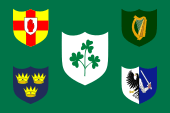 Guy Easterby
Guy Easterby Simon Easterby
Simon Easterby Dave Hewett
Dave Hewett Kees Meeuws
Kees Meeuws Horațiu Pungea
Horațiu Pungea Mahonri Schwalger
Mahonri Schwalger Bruce Douglas
Bruce Douglas Sean Lamont
Sean Lamont Scott Macleod
Scott Macleod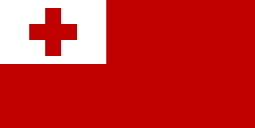 Inoke Afeaki
Inoke Afeaki Viliame Iongi
Viliame Iongi Sililo Martens
Sililo Martens Mike Hercus
Mike Hercus Dave Hodges
Dave Hodges
Coaching staff
Head coaches
| Name | Tenure |
|---|---|
| | 2003–2006[22] |
| | 2006–2008[22] |
| | 2008–2012[23] |
| | 2012–2014[23] |
| | 2014–[22] |
Current backroom staff
Correct as of 21 August 2016
| Name | Title |
|---|---|
| | Head coach |
| | Team manager |
| | Backs coach |
| | Defence coach |
| | Set piece coach |
| | Head of strength and conditioning |
| | Assistant strength and conditioning coach |
| | Assistant strength and conditioning coach |
| | Head Physiotherapist |
| | Physiotherapist |
| | Physiotherapist |
| | Head Analyst |
| | Analyst |
Results and statistics
Seasons
- 2003–04 Llanelli Scarlets season
- 2004–05 Llanelli Scarlets season
- 2005–06 Llanelli Scarlets season
- 2006–07 Llanelli Scarlets season
- 2007–08 Llanelli Scarlets season
- 2008–09 Scarlets season
- 2009–10 Scarlets season
- 2010–11 Scarlets season
- 2011–12 Scarlets season
- 2012–13 Scarlets season
- 2013–14 Scarlets season
- 2014–15 Scarlets season
- 2015–16 Scarlets season
- 2016–17 Scarlets season
Celtic League / Pro12
| Season | Pos | Played | Won | Drawn | Lost | Bonus | Points | |
|---|---|---|---|---|---|---|---|---|
| 2003–04 | 1st | 22 | 16 | 1 | 5 | 10 | 76 | |
| 2004–05 | 5th | 20 | 9 | 0 | 11 | 10 | 46 | |
| 2005–06 | 6th | 22 | 10 | 1 | 9 | 7 | 57[n 1] | |
| 2006–07 | 4th | 20 | 12 | 0 | 8 | 9 | 57 | |
| 2007–08 | 6th | 18 | 7 | 0 | 11 | 10 | 39 | |
| 2008–09 | 5th | 18 | 9 | 0 | 9 | 4 | 40 | |
| 2009–10 | 9th | 18 | 5 | 0 | 13 | 9 | 29 | |
| 2010–11 | 5th | 22 | 12 | 1 | 9 | 12 | 62 | |
| 2011–12 | 5th | 22 | 12 | 2 | 8 | 10 | 62 | |
| 2012–13 | 4th | 22 | 15 | 0 | 7 | 6 | 66 | |
| Semi-final | Ulster 28 – 17 Scarlets | |||||||
| 2013–14 | 6th | 22 | 11 | 1 | 10 | 9 | 55 | |
| 2014–15 | 6th | 22 | 11 | 3 | 8 | 7 | 57 | |
| 2015–16 | 5th | 22 | 14 | 0 | 8 | 7 | 63 | |
| 2016–17 | 3rd | 22 | 17 | 0 | 5 | 9 | 77 | |
| Semi-final | Leinster 15 – 27 Scarlets | |||||||
| Final | Munster 22 - 46 Scarlets | |||||||
| ||||||||
Celtic Cup
| Season | Round | Match | ||||||
|---|---|---|---|---|---|---|---|---|
| 2003–04 | Quarter-final | Llanelli Scarlets 12 – 14 Connacht | ||||||
| 2004–05 | Final | Munster 27 – 16 Llanelli Scarlets | ||||||
Heineken Cup / Rugby Champions Cup
| Season | Pool/Round | Pos | Played | Won | Drawn | Lost | Bonus | Points |
|---|---|---|---|---|---|---|---|---|
| 2003–04 | Pool 4 | 1st | 6 | 5 | 0 | 1 | 3 | 23 |
| Quarter-final | Llanelli Scarlets 10 – 27 Biarritz Olympique | |||||||
| 2004–05 | Pool 3 | 3rd | 6 | 2 | 0 | 4 | 5 | 13 |
| 2005–06 | Pool 6 | 3rd | 6 | 2 | 0 | 4 | 4 | 12 |
| 2006–07 | Pool 5 | 1st | 6 | 6 | 0 | 0 | 3 | 27 |
| Quarter-final | Llanelli Scarlets 24 – 15 Munster | |||||||
| Semi-final | Leicester Tigers 33 – 17 Llanelli Scarlets | |||||||
| 2007–08 | Pool 5 | 4th | 6 | 0 | 0 | 6 | 0 | 0 |
| 2008–09 | Pool 4 | 4th | 6 | 1 | 1 | 4 | 2 | 8 |
| 2009–10 (HC) | Pool 6 | 2nd | 6 | 4 | 0 | 2 | 1 | 17 |
| 2009–10 (ACC) | Quarter-final | RC Toulonnais 38 – 12 Scarlets | ||||||
| 2010–11 | Pool 5 | 3rd | 6 | 3 | 0 | 3 | 3 | 15 |
| 2011–12 (HC) | Pool 1 | 2nd | 6 | 3 | 0 | 3 | 3 | 15 |
| 2011–12 (ACC) | Quarter-final | Brive 15 – 11 Scarlets | ||||||
| 2012–13 | Pool 5 | 4th | 6 | 0 | 0 | 6 | 2 | 2 |
| 2013–14 | Pool 4 | 3rd | 6 | 2 | 1 | 3 | 1 | 11 |
| 2014–15 | Pool 3 | 4th | 6 | 2 | 0 | 4 | 0 | 8 |
| 2015–16 | Pool 3 | 4th | 6 | 0 | 0 | 6 | 2 | 2 |
| 2016–17 | Pool 3 | 3rd | 6 | 2 | 1 | 3 | 1 | 11 |
Anglo-Welsh Cup
| Season | Group/Round | Pos | Played | Won | Drawn | Lost | Bonus | Points |
|---|---|---|---|---|---|---|---|---|
| 2005–06 | Group C | 1st | 3 | 3 | 0 | 0 | 0 | 12 |
| Semi-final | Llanelli Scarlets 27 – 26 Bath Rugby | |||||||
| Final | London Wasps 26 – 10 Llanelli Scarlets | |||||||
| 2006–07 | Group C | 3rd | 3 | 1 | 0 | 2 | 1 | 5 |
| 2007–08 | Group D | 2nd | 3 | 2 | 0 | 1 | 3 | 11 |
| 2008–09 | Group D | 2nd | 3 | 2 | 0 | 1 | 0 | 8 |
| 2009–10 | Pool 2 | 2nd | 4 | 2 | 1 | 1 | 1 | 11 |
| 2010–11 | Pool 3 | 3rd | 4 | 2 | 0 | 2 | 1 | 9 |
| 2011–12 | Pool 3 | 1st | 4 | 3 | 0 | 1 | 3 | 15 |
| Semi-final | Northampton Saints 27 – 12 Llanelli Scarlets | |||||||
| 2012–13 | Pool 3 | 3rd | 4 | 2 | 0 | 2 | 0 | 8 |
| 2013–14 | Pool 4 | 3rd | 4 | 2 | 0 | 2 | 0 | 8 |
| 2014–15 | Pool 3 | 4th | 4 | 1 | 0 | 3 | 1 | 5 |
| 2016–17 | Pool 4 | 4th | 4 | 1 | 0 | 3 | 1 | 5 |
Honours
ERC Elite Awards
For the 10th anniversary season of the Heineken Cup, ERC, the tournament organisers, introduced the ERC Elite Awards scheme to recognise and reward the players and teams who have made outstanding contributions to the tournament. The Scarlets were awarded the ERC team award for playing 50 games,[24] and Robin McBryde, John Davies, Dafydd James and Iestyn Thomas were recognised for having made 50 appearances in the competition.[25]
See also
References
- ↑ http://www.scarlets.co.uk/eng/news/4060.php
- 1 2 3 "Player Records". scarlets.co.uk. The Scarlets. Retrieved 30 June 2012.
- ↑ "Scarlets drop Llanelli from name". BBC Sport. 11 September 2008. Retrieved 11 September 2008.
- ↑ "Llanelli open new home in style". BBC News. 15 November 2008. Retrieved 23 May 2010.
- ↑ "WRU drops provincial bombshell". BBC Sport. British Broadcasting Corporation. 20 February 2003. Retrieved 5 December 2006.
- ↑ "Moffett scraps northern expansion". BBC Sport. British Broadcasting Corporation. 8 January 2003. Retrieved 5 December 2006.
- ↑ "Layman's guide to Welsh rugby's crisis". BBC Sport. British Broadcasting Corporation. 12 March 2003. Retrieved 5 December 2006.
- ↑ "Scarlets launch regional vision". BBC Sport. British Broadcasting Corporation. 7 July 2003. Retrieved 5 December 2006.
- ↑ "Scarlets unveil Davies as coach". BBC Sport. 14 August 2006. Retrieved 5 December 2006.
- ↑ "Scarlets 'saved' by new investor". BBC Sport. British Broadcasting Corporation. 28 November 2006. Retrieved 5 December 2006.
- ↑ "Scarlets win on Stradey farewell". BBC Sport. British Broadcasting Corporation. 24 October 2008. Retrieved 18 November 2008.
- ↑ "Scarlets 16–18 Munster". BBC Sport. British Broadcasting Corporation. 28 November 2008. Retrieved 26 December 2008.
- ↑ Roberts, Gareth (12 December 2008). "Scarlets 16–16 Ulster". BBC Sport. British Broadcasting Corporation. Retrieved 26 December 2008.
- ↑ "Welsh regions included in Premiership Sevens Series". BBC Sport (British Broadcasting Corporation). 21 May 2014. Retrieved 23 March 2015.
- ↑ http://www.scarlets.co.uk/eng/heritage/history.php |accessdate=30 June 2012
- ↑ "Scarlets drop Llanelli from name". BBC Sport. British Broadcasting Corporation. 11 September 2008. Retrieved 11 September 2008.
- ↑ "Scarlets unveil new stadium name". BBC Sport. British Broadcasting Corporation. 20 May 2008. Retrieved 20 May 2008.
- ↑ "Scarlets stadium work goes online". BBC News. British Broadcasting Corporation. 7 April 2008. Retrieved 20 May 2008.
- ↑ "Llanelli open new home in style". BBC Sport. British Broadcasting Corporation. 15 November 2008. Retrieved 26 December 2008.
- ↑ "The new Llanelli Scarlets stadium". scarlets.co.uk. The Scarlets. 15 February 2008. Archived from the original on 19 February 2008. Retrieved 18 February 2008.
- ↑ "Scarlets Lions". scarlets.co.uk. Scarlets. Archived from the original on 4 May 2009. Retrieved 30 June 2009.
- 1 2 3 "Scarlets unveil Davies as coach". BBC News. 14 August 2006.
- 1 2 "Nigel Davies named as Gloucester coach after leaving Scarlets". BBC Sport (British Broadcasting Corporation). 2 June 2012. Retrieved 23 March 2015.
- ↑ http://www.ercrugby.com/eng/elite/team_awards.php
- ↑ http://www.ercrugby.com/eng/elite/fifty_tournament_caps.php
External links
| Wikimedia Commons has media related to Scarlets. |
- Scarlets official site (in English) (in Welsh)
- Scarlets on WRU.co.uk
- Scarlets on BBC.co.uk
- Scarlets Forum